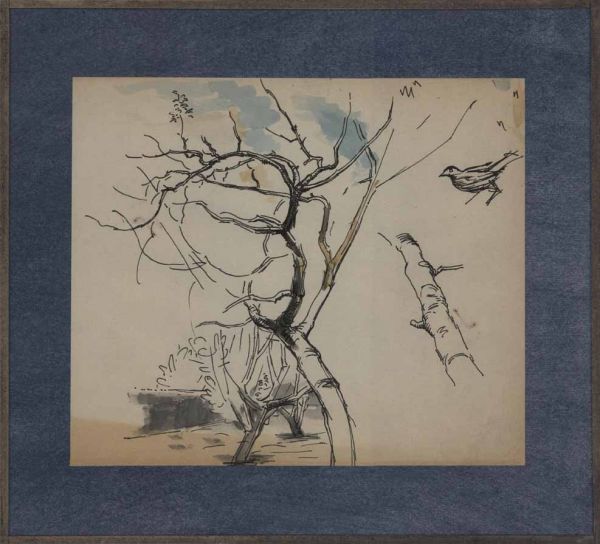
£700
Study of an apple tree with finch
Passe-partout (ref: 3435)
Pencil and watercolour, 8 7/8 x 10 3/8 in. (22.5 x 26.5 cm.)
12 5/8 x 14 in. (32 x 35.5 cm.) framed)
Tags: Charles Mahoney pencil watercolour farms/domestic animals flowers landscape

Pencil and watercolour, 8 7/8 x 10 3/8 in. (22.5 x 26.5 cm.)
12 5/8 x 14 in. (32 x 35.5 cm.) framed)
Tags: Charles Mahoney pencil watercolour farms/domestic animals flowers landscape
Provenance: The Artist's Studio
Mahoney’s interest in formal gardens and plants such as auriculas and old roses – all deeply unfashionable at the time – is typical of the originality and independence of his vision. His unbridled enthusiasm for plants was shared with Edward Bawden, Geoffrey Rhoades, John Nash and Evelyn Dunbar, with whom he swapped cuttings by post. The correspondence between this circle is full of exchanges about the discovery, nurturing and drawing of new potential subjects. Mahoney’s plant studies are so remarkably complete in their own right that it is barely possible to attempt to mark a line between botanical study and still life. The two became one and the same; and although some of his compositions were clearly arranged, they rarely appear contrived.
For drawing, Mahoney liked a textured paper, soft to the touch, such as Ingres, or still better, hand-made papers from firms such as Hayle Mill or Barcham Green. Occasionally he bought cheap sketchbooks from Woolworth’s because he found the paper so sympathetic as a surface for drawing. For his earliest drawings he used mainly B or 2B pencils, but he later preferred Black Prince or carbon pencils. He often used charcoal, adding white or red crayons to highlight drawings. Sometimes he combined these with conté crayons or pastels. For his later drawings he preferred pen and wash, taking great trouble to mix and dilute his inks until he achieved the required tone and colour. His drawing pens were either reservoir nibs in holders or else cartridge pens.